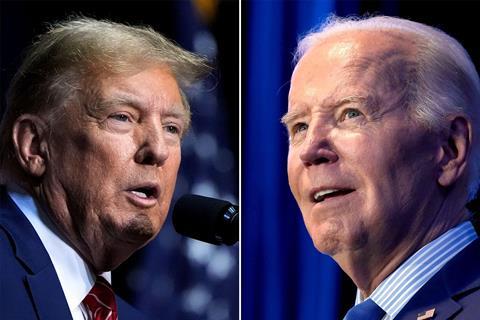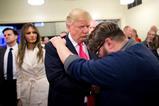There’s a sense of déjà vu about this year’s US presidential election. Jared Stacey explores how we can pray for the Church in America

Former president, Donald Trump, and President Joe Biden are poised for a rematch in the 2024 presidential election after Trump secured enough delegates in the Republican primary to secure his party’s nomination.
Although the US election often dominates global headlines, it is but one of 64 elections taking place this year. Experts estimate that nearly half of the world’s population will vote in 2024, amounting to 4 billion people.
Christians seek out churches where their political views will be reinforced, not interrogated
When my family and I moved to Scotland three years ago, we never imagined we’d be returning Stateside in 2024 to be confronted with another Biden and Trump rematch.
But here we are.
Faced with this political situation as both American citizens and Christians, I want to offer a few reflections for UK believers looking at America from the outside, in.
Expect the unexpected
Unforeseen events have often shaped American presidential elections. Abraham Lincoln entered the Republican convention in 1860 as a dark horse. He was be selected as the GOP (or Grand Old Party, a nickname of the Republican party) candidate as a compromise, and won the presidency without a single slave state. The Civil War started soon after.
Some incumbent presidents, such as Lyndon B Johnson, announced that they would not seek reelection. These historical examples point to the theological truth that Dietrich Bonhoeffer summarised well against the backdrop of 1930’s Germany: “The Church has no knowledge of the necessary course of history.”
Between concerns over Biden’s health and Trump’s court battles, there are many things that could happen between now and November that we might not otherwise expect.
Praying for more
Secondly, pray for the Church in America. Knowing the chaotic and unpredictable nature of politics should give American Christians pause from treating this election (or any other) as a litmus test for Christian faithfulness. And yet my continued conversations with US pastors over the last years confirms our churches have undergone a sorting in the wake of the pandemic and the 2020 election.
American Christians increasingly seek out churches where their political views will be reinforced, but not interrogated. This is what makes the Christian presence in the public square so dangerous: our unwillingness to question ourselves. We speak of culture war and occupying cultural institutions that have been “secularised” without telling the truth about our own complicity and idolatry.
The unpredictable nature of politics should give Christians pause
After all, how do we tell the truth about a Christian presence in the public square in the aftermath of January 6 and the riots on Capitol Hill? The MAGA movement, with its cultish loyalty to Trump, continues to assert itself as the only political option for true Christians in America. This leads most Americans to conclude the only things Christians bring to the public square are conspiracy theories, authoritarianism, and an increasing willingness to use violence as a means to secure power.
It is the responsibility of all Christians in America to bear witness to reconciliation, not political causes of retribution, no matter how much Christian language they use to justify themselves.
Faith first
To that end, UK Christians ought to pray for a united church in America and against a partisan American church. Whatever political responsibility God has for his Church will be found in our repentance and conversion to “seek first the Kingdom of God” (Matthew 6:33, ESV). There is a world of a difference between a Church who receives and lives from the “bond of peace” (Ephesians 4:3, KJV) made possible by the Spirit of Jesus, and one that makes itself an organ of the State.
As I return to America, I’m drawing from of the simple witness of Dutch pastor Jans Koopsman, who, during the Nazi occupation of Amsterdam, was labeled a saboteur for saying: “I am a Christian before I am Dutch.”
We have too easily accommodated ourselves to a Christianity that is intimately compatible with what it means to be American, forgetting that “to be renewed in the spirit of your mind” as Paul writes in Ephesians 4:23 (KJV), involves refusing to receive American values, means and ends as Christian.





































4 Readers' comments